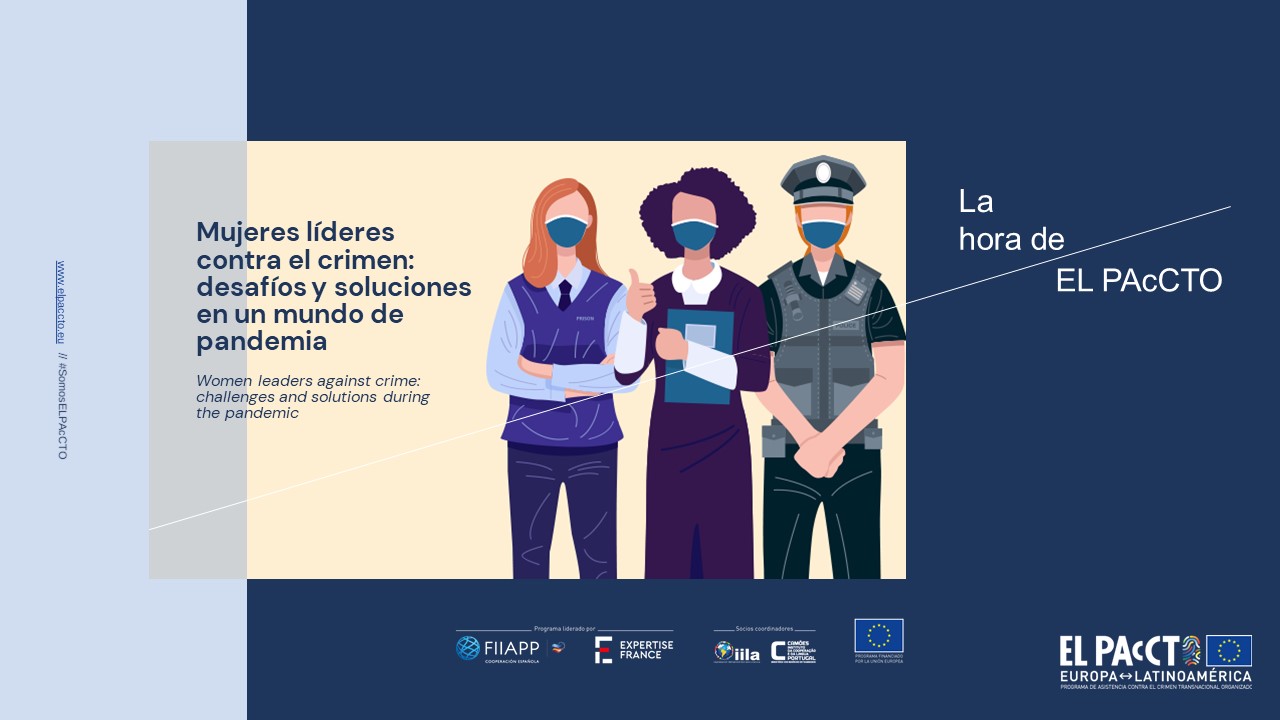The first chapter of “La hora de EL PAcCTO”, dedicated to women leaders who fight against organised crime, was a great success. 13 countries from Latin America and 5 from the European Union were present at the virtual event broadcast live on YouTube.
Anna Terrón, director of the International and Ibero-American Foundation for Administration and Public Policies (FIIAPP), spoke at the presentation, stressing that “a gender perspective increases not only the fairness but also the effectiveness of what we do. Security is not the same for men as it is for women. We have specific elements that concern us, especially in the field of security. The fact that there are women leading means that these elements are not going to escape us.”
Ms Terrón said: “I was there the day the current director of the Spanish Civil Guard took office, and I remember the emotion I felt when she addressed a large number of public representatives and their institutions. She revealed her priorities in office and at one point said ‘I am a feminist‘. Those were words that surely had never been spoken on that parade ground. It was important because it suggested that many more women were going to step forward.”
Martin Seychell, INTPA’s Deputy Director General, explained that “the participation and leadership of women is part of the new EU Gender Action Plan for the period from 2021 to 2025.” Mr Seychell said: “women play a key role in fighting organised crime, preventing and resolving conflicts, and promoting security and peace. More women leaders and more of a gender perspective will improve the fight against organised crime.”
INTPA’s Deputy Director General recognised that “the Member States are joining forces in #TeamEurope, and with our partners in Latin America we want to seek programmes and strategies that will transform security and justice in the coming years. A job in which gender perspective is very important. To this end, the European Union is committed to ensuring that 85 percent of the new actions that are promoted integrate gender qualities and the participation of women.”
The panellists were:
- Alexandra Jour-Schroeder. Deputy Director General, DG FISMA, European Commission
- Beatriz Rodríguez. Director of criminal studies, Ecuadorian Prosecutor’s Office.
- Rosa Icela Rodríguez Velázquez. Secretary of Security and Citizen Protection (SSPC), Mexico
- Cecilia Pérez Rivas. Minister for Justice, Paraguay
- Luísa Proença. Deputy National Director of the Judicial Police, Portugal
Networks of women leaders to fight crime effectively
The participants in this event expressed the need to create networks of women who can work together and engage in dialogue to face future security and justice challenges. The objective is a more effective fight against organised crime where the female perspective is as prominent as the male one.
Alexandra Jour-Schroeder, Deputy Director-General of DG FISMA at the European Commission, said: “women leaders make a difference because they have different perspectives in all areas of society and in the fight against crime. But female leaders don’t fall from the sky: they need training, recognition, opportunities and support. Women leaders need networks to communicate, interact and cooperate.”
For her part, Luísa Proença, Deputy National Director of the Judicial Police of Portugal, stated that “the participation of women is essential for an evolved, modern and more egalitarian police force. What’s also needed is a good work-life balance that allows women to have equal employment opportunities. Ms Proença concluded by saying that “the right to equal opportunities is fundamental, the presence and role of women in key institutions needs to be consolidated every day”.
Beatriz Rodríguez, director of criminal studies at the Ecuadorian Prosecutor’s Office, recognised the existence of “structural difficulties that limit progress. A new development model with more equity and inclusion is needed to facilitate women in senior decision-making positions. It is important to promote the participation of women and justice institutions to break stereotypes. It is also important to have ongoing training for women.”
Paraguay’s Minister for Justice, Cecilia Rivas, said: “it is important to be united, creative and coordinated. For this it is important that women are present in positions of power to give public policies the comprehensive approach that women contribute.”
Finally, Mexico’s Secretary for Security, Rosa Icela Rodríguez, said: “women’s leadership in Mexico is the result of years of struggle and their progress contributes to our democratic life. It is important to continue transforming the system and show that women can deal with whatever challenges we are faced with.”
The participation of women has enormous benefits in society
The Secretary General of IILA, Antonella Cavallari, closed the event with these conclusions:
- It is important to make visible the unique contribution of women in the fight against organised crime, which is traditionally reserved for men.
- The full participation of women in public life has enormous benefits for society; it generates greater efficiency. The point of view of women favours innovative policies.
- There is female leadership in justice, as shown by the interventions of the panellists, and the global situation is not so bad if we look at the representation of women leaders today and in EU institutions
- The presence of female professionals in justice facilitates women’s access to justice.
- Occasions like today form networks for further progress.
- COVID has hit women particularly hard because they are more often employed in informal sectors, in care sectors, and due to issues of abuse and violence against women.
- The pandemic is an opportunity to make us reflect and to overcome problems such as violence against women. We must harness the economic resources and political support that can emerge from the pandemic to improve the situation of women.
